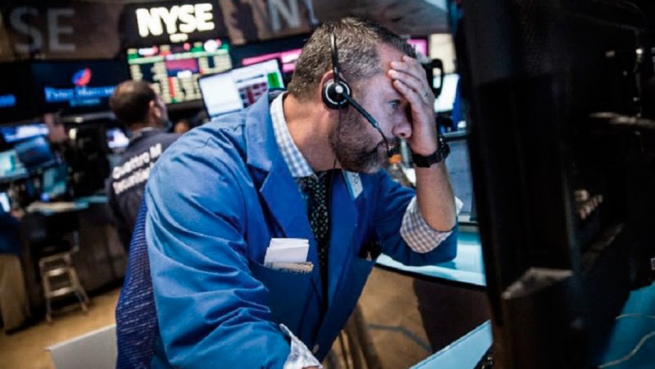The New York stock markets collapsed this Thursday, a day after the Federal Reserve (FED) increased its reference interest rate by half a point, on a day in which investors liquidated a large part of their portfolios due to fears that the monetary policy of the organization, which seeks to curb inflation, finally leads to a recessive scenario.
The Dow Jones industrial average fell 3.12%, the expanded S&P 500 index fell 3.57% and the Nasdaq technology indicator fell 4.99%, according to data provided by the New York Stock Exchange (NYSE).
The strong stock sell-off resulted in the worst trading day since September 2020.
The technological papers were the most damaged: Meta, parent company of Facebook, and Amazon fell 6.8% and 7.6%respectively.
To this were added Microsoft, with a drop of 4.4%; Salesforce, with a red of 7.1%; and Apple, which sank 5.6%.
E-commerce stocks were another source of weakness, following some disappointing quarterly reports.
Etsy and eBay fell 16.8% and 11.7%, respectively, after issuing a weaker-than-expected earnings forecast. Shopify fell nearly 15% after missing estimates on the top and bottom lines.
The FED rate hike led the 10-year Treasury Bond yield to rise to 3.04%. Rising yields also pressured mortgage rates to 5.3% and are at their highest level since 2009.
The Fed’s aggressive shift in raising interest rates has investors concerned about whether it can strike the delicate balance to slow the economy enough to stop high inflation, but not enough to cause a recession.

Analysts agree that the pace and size of interest rate increases are being “closely” scrutinized on Wall Street.
High stock prices are incompatible with the Fed’s desire to tighten financial conditions. The agency must be careful with the adjustments because it can harm the labor market.
Unless supply chains normalize and recover quickly or workers return to the workforce, any rally in stocks is likely to turn strange in this scenario of rising interest rates.
The volatility that was reflected in these last two days shows the degree of confusion that investors have and until the information from the FED meeting is sifted, volatility will set the course of the market.
The agency also announced that it will begin to reduce its enormous deficit in its balance of 9 billion dollars, caused by the purchase of Treasury Bonds and mortgages, derived from the 2008 crisis.
As of June 1, the Fed will begin returning these large holdings to the financial system, with the aim of keeping interest rates on mortgages low.
The average rate on a 30-year fixed-rate mortgage rose to 5.3%, their highest level since 2009, according to data from trustee Freddie Mac. Mortgage rates tend to track movements in the 10-year Treasury note. The sharp increase in mortgage rates is testing the financial capacity of home buyers, after years of strong price increases.
Adjustments in rates to combat inflation seem to be the tool used by the main central banks of the world.

The Bank of England (BoE) raised its benchmark interest rate to 1% on Thursday, the highest level in 13 years, which represents its fourth rate hike since December, as UK inflation hits highs of 30 years and could reach 10% per year.
In the same way, the European Central Bank (ECB) is expected to decide on a similar adjustment starting next week.
In the Dow Jones there were no rises and the papers that lost the least were Merck (-0.6%), Amgen (-0.7%) and Chevron and Coca Cola (-0.8%).
The best of the S&P 500 went to Epam (10.7%), Albemarie (9.8%) and Organon (5%).
On the Nasdaq, the increases in Booking (3.3%), Charter (1.8%) stood out and the lowest losses were noted in Kraft Heinz and Keurig Dr Pepper (-0.4%) and Activision Blizzard (-0.6%).
In Europe, European markets closed lower, despite being bullish for much of the session as traders weighed BoE warnings and a strong US sell-off.
In the leading Euro Stoxx 50 index, which fell 0.8%, the rises of Airbus (6.3%), the Spanish (2.7%) and the German SAP (1.9%) stood out.
In London, the FTSE rose 0.1%, while the Frankfurt DAX fell 0.5% and the Paris CAC 40 fell 0.4%.
In the Mediterranean, the IBEX 35 in Madrid fell 0.8% while the MIB in Milan fell 0.6%.


















